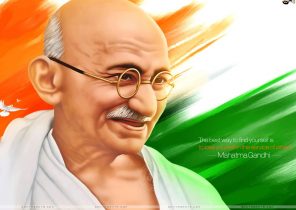GANDHI JAYANTHI
Gandhi Jayanthi is a national event celebrated in India to mark the birth anniversary of the Father of our nation, Mohandas Karamchand Gandhi. It is celebrated yearly on 2nd October in all states and union territories. Gandhi Jayanti is marked by tributes all over India, and also at Gandhi's memorial Raj Ghat in New Delhi where he was cremated. Activities include prayer meetings, commemorative ceremonies in different cities by colleges, local government institutions and socio-political institutions. Painting and essay competitions are conducted and best awards are granted for projects in schools and the community encouraging a non-violent way of life. Gandhi's favourite bhajan, Raghupati Raghav Raja Ram is usually sung in his memory. Statues of Mahatma Gandhi throughout the country are decorated with flowers and garlands. In 2007, the UN General Assembly adopted a resolution to celebrate 2nd October as the International Day of Non-Violence which Gandhi stood for.
With several events lined up across the country, India will celebrate the 150th birth anniversary of Mahatma Gandhi. Apart from programmes being organised by the Union and state governments and UNICEF India have launched 'The Gandhian Challenge'. Several photo exhibitions have also been organised in different cities to mark Mahatma Gandhi's 150th birth anniversary. Prime Minister Narendra Modi will start the day with a visit a visit to Rajghat. Later in the evening, he will fly off to Ahmedabad and visit Sabarmati Ashram. The Prime Minister, who launched the 'Swachh Bharat' campaign in 2014, in memory of Gandhi, will take part in an event for cleanliness there.
Mohandas Karamchand Gandhi was born on 2nd October 1869. He was a lawyer and political ethicist. Born and raised in a Hindu family in coastal Gujarat, Gandhi was trained in law at the Inner Temple, London. After two unsure years in India, where he was unable to start a successful law practice, he moved to South Africa to represent an Indian merchant in a lawsuit. He went on to stay for 21 years. It was in South Africa that Gandhi raised a family, and first employed non-violent resistance in a campaign for civil rights. In 1915, he returned to India. He started organising peasants, farmers, and urban labourers to protest against excessive land-tax and discrimination. After accepting leadership of the Indian National Congress in 1921, Gandhi led nationwide campaigns for removing poverty, expanding women's rights, ending untouchability and most of all, achieving Swaraj or self-rule. That year, Gandhi adopted the Indian loincloth or short dhoti and, in the winter, a shawl, both woven with yarn hand-spun on a traditional Indian spinning wheel or charkha, as a mark of recognition with India's rural poor. Then, he lived modestly in a self-sufficient community, ate simple vegetarian food and undertook long fasts as a mean of self-purification. Gandhi led common people in challenging the British-imposed salt tax with the 400 km Dandi Salt March in 1930 and was later called in for the British to Quit India Movement in 1942. He was imprisoned for many years in both South Africa and India. On 30th January 1948, one of the unluckiest days in the history of India, Nathuram Godse, a Hindu nationalist, assassinated Gandhi on by firing three bullets into his chest.
We will always remember Gandhiji’s principles and will always cherish him in our memory. To all my fellow Indians, a very happy Gandhi Jayanthi. Let us ensure that our generation do not forget his ideals and what he fought for.

